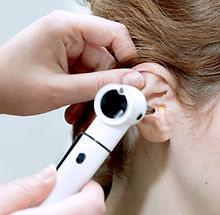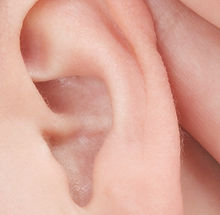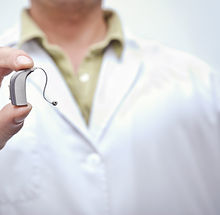
ELRIETHA OLIVIER
HEARING, HEARING AID &
COMMUNICATION CARE
WWW.HEARINGSA.COM
Audiologist & Speech Therapist
I recognize the importance of a person-centered experience when doing hearing tests and fitting hearing aids. This inspires me to create strong and long-lasting bonds with each of my clients. It’s a privilege to serve the community of the West Coast & Saldanha Bay District by providing quality audiology services, hearing tests, hearing aid fittings, noise protection and communication care through sound advice and responsible diagnoses and procedures.
HEARING & COMMUNICATION SERVICES
"making our way between the sounds that distract and those that inspire" (Marc Malandra)
I’ve been working as a professional Audiologist & Speech Therapist since 1999, constantly developing and advancing my audiological techniques and therapy skills. It has been a wonderful journey to work with people in need of hearing tests, hearing aids and communication support. I gained additional experience in the UK and will provide several services and specialized procedures for your convenience. Get in touch to learn more about the ways in which I can help you.
DIAGNOSTIC AUDIOLOGY & HEARING TESTS & HEARING AIDS
COMMUNICATION CARE & SUPPORT
HEARING AID FITTINGS, MAINTENANCE & REPAIR
SPEECH-LANGUAGE CONSULTATION




Taking care of your needs for a hearing test and comprehensive hearing results.
Overcome the communication barrier and concerns - together.
Fit hearing aids according to prescription, support maintenance and recommend assistive listening devices.
Communication is an exchange of ideas. At times we need to speak and at times we need to listen...
ABOUT ME
I understand that your hearing health and hearing wellness concerns extend beyond routine procedures. I have a Bachelor's Degree in Audiology & Speech Therapy and a Master's Degree in Pastoral Counseling and am registered with the HPCSA. I am keen on hearing care, fitting hearing aids, research, lecturing, student training and to provide an array of comprehensive audiology and hearing services and procedures within my field.

Services:
Who is Elrietha Olivier Audiologist?
Elrietha Olivier is an audiologist who specializes in diagnosing and treating hearing loss and other auditory disorders.
1. What services does Elrietha Olivier, Audiologist, offer?
Elrietha Olivier is an audiologist based in South Africa. As an audiologist, she specializes in the diagnosis and treatment of hearing, prescribing hearing aids and balance disorders. Some of the services that Elrietha Olivier Audiologist may offer include:
-
Hearing assessments: Elrietha Olivier Audiologist can perform hearing tests to evaluate a person's ability to hear different frequencies and volumes. Based on the results, she can recommend appropriate treatments or interventions.
-
Hearing aid fittings: If a person has hearing loss, Elrietha Olivier Audiologist can help them choose and fit a hearing aid that meets their needs. She can also provide ongoing support and maintenance for the hearing aid.
-
Tinnitus management: Tinnitus is a condition where a person hears ringing or buzzing in their ears. Elrietha Olivier Audiologist can help manage tinnitus through various treatments, such as sound therapy or counseling.
-
Balance assessments: Elrietha Olivier Audiologist can evaluate a person's balance and vestibular function to determine if there are any underlying issues that need to be addressed.
It's important to note that the specific services offered by Elrietha Olivier, Audiologist, may vary depending on the individual's needs and the scope of her practice.
2. How can I make an appointment with Elrietha Olivier, Audiologist?
To make an appointment with Elrietha Olivier Audiologist, you can try the following options:
-
Visit her clinic's website or social media pages to see contact information to make an appointment.
-
You are more than welcome to send a message to the WhatsApp Business number provided on the website and the practice will be in contact with you to provide more information, or to arrange an appointment.
-
Call her clinic directly and inquire about scheduling an appointment with her. Please leave a message if the call can't be answered immediately.
-
If you were referred to her by your primary care physician or another healthcare provider, they may be able to assist you in scheduling an appointment.
It's important to note that appointment availability may vary and there may be a wait time to see her. It's best to contact her clinic as soon as possible to schedule an appointment that works for you.
3. What should I expect during a hearing test with Elrietha Olivier, Audiologist?
During a hearing test with Elrietha Olivier, Audiologist, you can expect a thorough evaluation of your hearing abilities. This may include a series of tests to determine the range, sensitivity, and clarity of your hearing. The process may involve placing headphones over your ears and playing sounds of different volumes and frequencies. You may also be asked to repeat words or phrases to test your speech recognition skills. Based on the results of the test, Elrietha Olivier Audiologist can recommend appropriate treatment options, such as hearing aids or cochlear implants, if necessary. It is important to communicate any concerns or questions you may have with your audiologist during the appointment.
4. Does Elrietha Olivier Audiologist offer hearing aid fittings and repairs?
Elrietha Olivier is an audiologist who practices in South Africa. She offers hearing aid fittings and repairs as these are common services provided by audiologists. Internationally known, prescription hearing aids are offered and fitted according to your needs and according to best practice recommendations. The hearing aids will therefore be programmed and fitted specifically to your hearing loss and your needs for better hearing. However, it is best to contact her directly or visit her website to learn more about her specific practice and hearing aids offered.
ELRIETHA OLIVIER
Send a WhatsApp or SMS and I will contact you.
17 Voortrekker Street, Vredenburg, West Coast, South Africa
0729067198
.jpg)
Frequently Asked Questions FAQ

Who is Elrietha Olivier and what is her expertise in hearing and communication?
Elrietha Olivier is a South African audiologist with over 20 years of experience in the field of hearing and communication. She is an expert in diagnosing and treating hearing loss, as well as providing communication solutions for individuals with hearing impairments.

What are the common causes of hearing loss?
There are several common causes of hearing loss, including:
-
Aging - as we get older, our hearing ability can decline.
-
Exposure to loud noise - prolonged exposure to loud noise can damage the delicate hair cells in the inner ear.
-
Ear infections - infections such as otitis media can cause temporary or permanent hearing loss.
-
Genetics - some types of hearing loss can be inherited.
-
Medications - certain medications can cause hearing loss as a side effect.
-
Trauma - injury to the head or ear can cause hearing loss.
It's important to protect your hearing and seek medical attention if you experience any changes in your hearing ability.

How can hearing aids improve communication for individuals with hearing loss?
Hearing aids can significantly improve communication for individuals with hearing loss. They work by amplifying sounds and making them clearer and easier to understand. This can help individuals with hearing loss to better distinguish speech sounds, especially in noisy environments.
Hearing aids can also help individuals with hearing loss to hear a wider range of sounds, including softer sounds that they may not have been able to hear before. This can help them to better understand conversations and enjoy music and other audio experiences.
It is important to note that while hearing aids can be very helpful, they may not completely restore normal hearing. It is also important to work with a qualified audiologist to ensure that the hearing aids are properly fitted and adjusted for the individual's specific needs.
Frequently Asked Questions FAQ

What are some effective communication strategies for individuals with hearing impairments?
Individuals with hearing impairments may face communication challenges, but there are several effective strategies that can enhance their ability to communicate effectively. Here are a few strategies:
-
Face the person directly and maintain eye contact: This allows the individual to read lips and facial expressions, which can aid in understanding the conversation.
-
Speak clearly and at a moderate pace: Avoid shouting or speaking too slowly, as this can distort the speech and make it harder to understand.
-
Minimize background noise: Turn off TVs or radios, close windows, and avoid noisy areas to reduce distractions.
-
Use visual aids: Utilize written notes, diagrams, or pictures to supplement verbal communication.
-
Use technology: There are several assistive devices available such as hearing aids, cochlear implants, and FM systems that can help individuals with hearing impairments communicate more effectively.
Remember to be patient and ask the individual how you can best communicate with them. By implementing these strategies, you can help facilitate effective communication with individuals who have hearing impairments.

How can parents help their children with hearing loss succeed academically and socially?
Parents can play a crucial role in helping their children with hearing loss succeed academically and socially. Here are some tips:
-
Early intervention: It is important to identify hearing loss early and seek appropriate intervention. This can include hearing aids, cochlear implants, or other assistive devices.
-
Communication: Parents should work with their children's teachers and other professionals to develop a communication plan that works best for their child. This may include sign language, lip reading, or other forms of communication.
-
Advocacy: Parents should advocate for their child's needs in school and in the community. This may include requesting accommodations such as preferential seating, captioning, or other assistive technology.
-
Socialization: Encouraging socialization with peers can help children with hearing loss develop social skills and build self-confidence. Parents can facilitate playdates, enroll their child in extracurricular activities, and encourage participation in social events.
-
Support: Finally, parents should provide emotional support to their child and ensure that they feel valued and included. This can involve celebrating their achievements, providing positive feedback, and being available to listen and offer guidance when needed.

Do hearing aids cure dementia?
Hearing loss and dementia are two distinct conditions, but they can be connected in several ways. While hearing loss does not directly cause dementia, there is evidence to suggest that untreated hearing loss may contribute to cognitive decline and increase the risk of developing dementia.
Several studies have found a link between hearing loss and cognitive issues. The theory is that when individuals have hearing loss, their brains must work harder to process and understand speech, which can lead to cognitive overload. Over time, this increased cognitive load may accelerate cognitive decline and potentially contribute to the development of dementia.
Additionally, hearing loss can lead to social isolation and a reduced quality of life. When individuals have difficulty hearing and engaging in conversations, they may withdraw from social interactions, which can have negative effects on mental health and cognitive abilities. Social isolation and loneliness have been associated with an increased risk of dementia.
Fortunately, using hearing aids can be beneficial for individuals with hearing loss, particularly in relation to dementia. Research suggests that treating hearing loss with hearing aids can help improve communication, cognitive function, and overall well-being. By amplifying sounds and enhancing speech perception, hearing aids can reduce the cognitive load placed on the brain, allowing individuals to engage more effectively in social interactions and maintain cognitive abilities.
It's important to note that while hearing aids can provide significant benefits, they do not prevent or cure dementia. However, by addressing hearing loss, individuals may potentially reduce some of the associated risks and improve their overall quality of life. If you or someone you know is experiencing hearing loss or cognitive decline, it's advisable to consult with a healthcare professional for a proper evaluation and guidance.
Frequently Asked Questions FAQ

Are there different type of hearing aids?
There are several different types of hearing aids available today, each designed to address specific hearing loss needs and preferences. Here are some common types:
-
Behind-the-Ear (BTE) Hearing Aids: These hearing aids consist of a small device that sits behind the ear. The device is connected to an earmould or a custom-fit earpiece that fits inside the ear canal. BTE aids are suitable for a wide range of hearing loss and offer various features.
-
Receiver-in-Canal (RIC) or Receiver-in-the-Ear (RITE) Hearing Aids: RIC/RITE aids have a small device placed behind the ear, connected to a receiver (speaker) that sits directly in the ear canal. This design allows for a more natural sound experience, as the sound is delivered directly into the ear. RIC/RITE aids can accommodate mild to severe hearing loss.
-
In-the-Ear (ITE) Hearing Aids: ITE aids are custom-made to fit the shape of the outer ear. They fill the outer part of the ear and are available in different sizes. ITE aids can accommodate mild to severe hearing loss and may include features like volume control and directional microphones.
-
In-the-Canal (ITC) and Completely-in-the-Canal (CIC) Hearing Aids: These are smaller and more discreet hearing aids that fit partially or completely inside the ear canal, making them less visible. ITC and CIC aids are suitable for mild to moderate hearing loss. Due to their small size, they may have limited features.
-
Bone-Anchored Hearing Aids (BAHA): BAHA devices are surgically implanted and use bone conduction to transmit sound to the inner ear. They are beneficial for individuals with conductive hearing loss, single-sided deafness, or certain types of mixed hearing loss.
It's important to note that the suitability of each type of hearing aid depends on factors such as the degree and type of hearing loss, ear anatomy and earwax challenges, individual preferences, and lifestyle. Consulting with an audiologist or hearing healthcare professional can help determine the most appropriate type of hearing aid for your specific needs.

What is a cochlear implant?
A cochlear implant is a small electronic device that is surgically implanted in the ear to provide a sense of sound to individuals with severe to profound hearing loss. It is designed to bypass the damaged or non-functioning parts of the inner ear (cochlea) and directly stimulate the auditory nerve, allowing the person to perceive sound.
The cochlear implant consists of two main components: the internal component and the external component. The internal component, which is surgically implanted, consists of a receiver-stimulator that is placed under the skin behind the ear, and an electrode array that is inserted into the cochlea. The external component consists of a microphone, speech processor, and transmitter that are worn outside the ear, typically behind or on the ear.
Here's how a cochlear implant works:
-
Sound is picked up by the microphone in the external component.
-
The sound is processed and analyzed by the speech processor, which converts it into digital signals.
-
The processed signals are transmitted wirelessly to the internal component.
-
The internal component receives the signals and delivers electrical impulses to the electrode array in the cochlea.
-
The electrode array stimulates the auditory nerve fibers, bypassing the damaged hair cells in the cochlea.
-
The auditory nerve sends the electrical signals to the brain, where they are interpreted as sound.
The brain gradually learns to interpret these electrical signals as sound, and with time and rehabilitation, individuals with cochlear implants can often understand speech and perceive various sounds. Cochlear implants can significantly improve the quality of life for people with severe hearing loss or deafness, allowing them to communicate, enjoy music, and participate more fully in social activities.

Earwax Management
Proper earwax management is important for maintaining ear health and preventing discomfort or hearing problems. Here are some guidelines for earwax management:
-
Understand the function of earwax: Earwax, also known as cerumen, is a natural substance produced by the glands in the ear canal. It helps to lubricate and protect the ear by trapping dust, debris, and harmful bacteria, preventing them from reaching the eardrum.
-
Do not insert cotton swabs or other objects into the ear: Contrary to popular belief, using cotton swabs, bobby pins, or other objects to clean the ears can actually push the earwax deeper into the ear canal, leading to impaction or damage to the ear. It is essential to avoid inserting anything smaller than your elbow into your ear.
-
Allow the ear to clean itself: Normally, the ear is self-cleaning, and excess earwax will naturally migrate from the ear canal to the outer ear. Chewing, talking, and jaw movements also help to move the wax out of the ear canal.
-
Recognize the signs of excessive earwax: If you experience symptoms like earache, ear fullness, decreased hearing, ringing in the ear (tinnitus), or dizziness, it may indicate a buildup of earwax. It's best to consult a healthcare professional for an accurate diagnosis.
-
Seek medical assistance if necessary: If you have a significant earwax buildup or are experiencing symptoms related to earwax impaction, it is advisable to visit a healthcare professional. They can examine your ears and suggest appropriate treatment.
-
Professional earwax removal: Depending on the severity of the impaction, a healthcare professional may perform earwax removal using various methods. These can include irrigation with warm water, suction, or manual removal with specialized instruments. It is not recommended to attempt removing impacted earwax at home without professional guidance.
Remember, everyone's ears produce different amounts of earwax, and some individuals may naturally have more or less wax. If you have concerns about your earwax or are experiencing symptoms, it's always best to consult with a healthcare professional for proper evaluation and guidance.





